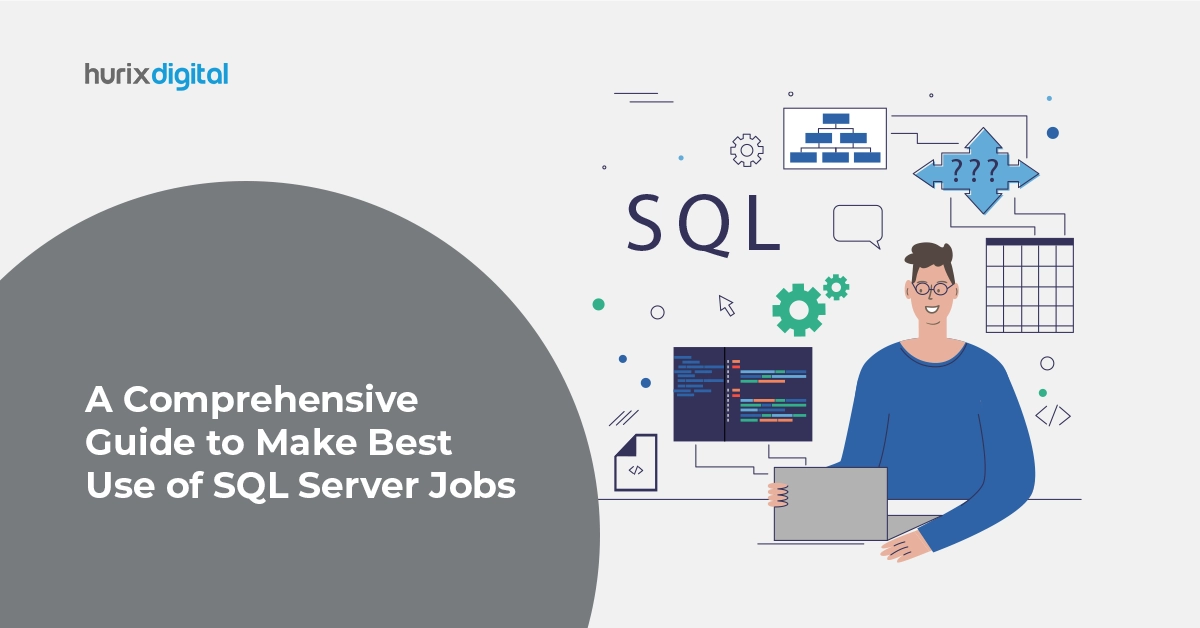
A Comprehensive Guide to Make Best Use of SQL Server Jobs
Summary
SQL Server jobs are planned tasks that can be executed in a Microsoft SQL server. With the help of these jobs, we can perform multiple operations like running queries, importing data, regular backup of databases, status of SQL server services, disk space monitoring, and we can also perform maintenance tasks.
These SQL Server jobs can be created, managed, and scheduled using SQL server management studio or from T-SQL commands. This helps database administrators to automate scheduled tasks and make their database management process easy.
Let’s learn more about SQL Server Jobs in this blog!
Table of Contents:
- Why Do You Need SQL Server Jobs?
- What Tools Can Be Used to Create SQL Server Jobs in the Cloud?
- What are the Different Types of SQL Server Jobs in the Cloud?
- What is the Need to Monitor SQL Server Jobs in the Cloud?
- What Happens if You Don’t Monitor SQL Server Jobs?
- What are the Industry Trends in Monitoring SQL Server Jobs?
- Conclusion
Why Do You Need SQL Server Jobs?
There are many reasons that SQL Server jobs are important :
- Automated Tasks: SQL Server jobs in the cloud can be used to automate various tasks such as data extraction, transformation, and loading (ETL), database maintenance, and report generation. Also, this helps improve efficiency and accuracy by minimizing manual efforts.
- Scalability: Cloud-based SQL Server jobs allow for easy scaling of resources based on demand. It means we can easily adjust the resources allocated to jobs based on the workload, which leads to better performance and cost-efficiency in the cloud.
- Flexibility: Cloud-based SQL Server jobs offer flexibility in terms of scheduling and monitoring. We can easily manage jobs from any location and also set alerts and notifications for any issues that arise like disk space alerts, and SQL server services status alerts.
- Cost-Effectiveness: Using SQL Server jobs in the cloud can help reduce infrastructure costs as we only pay for the resources that are used. It is a very cost-effective solution for managing and executing tasks in an SQL server environment.
- Security: Cloud providers often have robust security measures in place to protect data, making it a secure option for running SQL Server jobs. Additionally, you can implement encryption and access controls to further enhance security.
Also Read: Why are Cloud Application Services More Secure than On-Premise Solutions?
What Tools Can Be Used to Create SQL Server Jobs in the Cloud?
Let’s have a look at the tools:
- SQL Server Management Studio (SSMS): This is a popular tool for managing and creating SQL Server jobs. It allows users to easily create, edit, and schedule tasks in the cloud using Task Scheduler.
- Azure Data Studio: This is a lightweight, cross-platform tool that provides a modern interface for creating, editing, and scheduling SQL Server tasks in the cloud.
- Azure Portal: Users can also create and manage SQL Server jobs directly in the Azure Portal, using the built-in tools and resources available.
- Azure PowerShell: PowerShell scripts can be used to automate the creation and management of SQL Server jobs in the cloud.
- Azure CLI: The Azure Command Line Interface (CLI) can also be used to create and manage SQL Server jobs in the cloud through the command line interface.
- Azure DevOps: For more advanced automation and integration, Azure DevOps provides a platform for creating, scheduling, and managing SQL Server jobs in the cloud as part of a larger CI/CD pipeline.
What are the Different Types of SQL Server Jobs in the Cloud?
Here are some of the jobs based on best practices:
- Backup Jobs: Regularly create copies of data to ensure data recovery in case of loss or system failure.
- Index Rebuild & UpdateStats Jobs: Recreate indexes to optimize performance & Maintain accurate statistics for query optimization.
- Database Services Monitoring Job: Monitor the health and performance of database services.
- Database Backup Report Job: Generate reports summarizing backup activities.
- Disk Space Monitoring Job: Monitor available disk space on servers or storage systems.
What is the Need to Monitor SQL Server Jobs in the Cloud?
Monitoring SQL server jobs in the cloud is very important for maintaining your database environment’s reliability, performance, and security. By monitoring job executions, administrators can find errors and address issues quickly, also minimizing downtime. Monitoring helps optimize resource utilization by identifying problems and errors in job execution, with the help of this, administrators can work on timely adjustments to ensure good performance.
What Happens if You Don’t Monitor SQL Server Jobs?
If you don’t monitor SQL Server jobs, several issues can arise:
- Unidentified Failures: Without monitoring, you may not be aware of job failures or errors until users report issues, leading to delays in identifying and resolving problems.
- Performance Degradation: Poorly performing SQL Server jobs can impact database performance and overall system responsiveness, leading to degraded user experience and potential service disruptions.
- Resource Contention: Jobs with inefficient queries or resource-intensive tasks can consume excessive CPU, memory, or disk I/O, causing resource contention and affecting the performance of other applications or services running on the same server.
- Data Integrity Risks: Failed or incomplete jobs can result in data inconsistencies or data loss, compromising data integrity and potentially leading to compliance violations or business disruptions.
- Security Vulnerabilities: Unmonitored jobs may execute unauthorized or malicious
commands which leads to security breaches and data breaches or unauthorized access to sensitive information. - Compliance Concerns: Lack of monitoring results in non-compliance with regulatory
requirements or internal policies related to data access, auditing trails, and job scheduling, exposing the organization to legal and financial risks.
What are the Industry Trends in Monitoring SQL Server Jobs?
- Efficiency Boost with Automation: Nowadays organizations are making their work easy with the help of automation to keep an eye on SQL server jobs. With the help of this automation, businesses can fetch the issues quickly and fix them before they become big problems. With these trends, companies save time and ensure that operations run smoothly without continuous user monitoring.
- Smart Decision-Making with Data Insights: Another trend is that industries can use data from SQL Server job monitoring to make smart decisions. By continuously analyzing data about how SQL server jobs are running, companies can understand patterns, also they can identify areas for improvement, and make well-informed decisions to optimize their operations. This trend helps businesses to run the game and also improve their processes.
Also Read: SCORM Cloud or Traditional LMS: Which One to Choose?
Conclusion
Choose the right approach that aligns with your business needs and goals to improve efficiency and productivity. Hurix Digital understands this, and helps your business grow effortlessly!
Contact Hurix Digital’s Cloud Infrastructure Services to explore the best tools and techniques for monitoring SQL server jobs in the cloud and monitoring cloud infrastructure. By exploring these resources, organizations can automate the manual task using these tools.

DB Consultant – Cloud Services
Saloni is an experienced DB Consultant with strong knowledge of SQL and NoSQL DBs. She is a Certified Microsoft professional for performing complex Database migration tasks and other requirements of clients from different geographical areas. Whenever she is assigned to a task for a technology she is not aware of, she performs it like an experienced professional with her self-learning skills.




